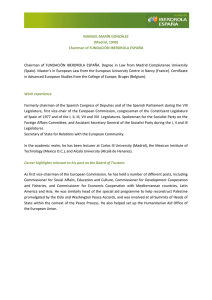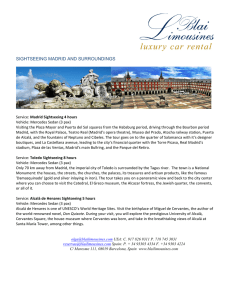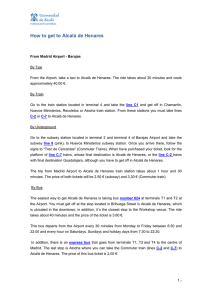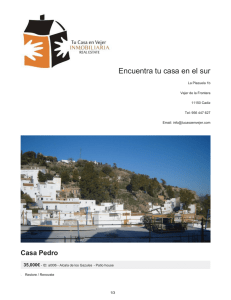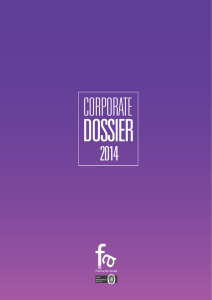The Economics of Friendship among Scientists
Anuncio
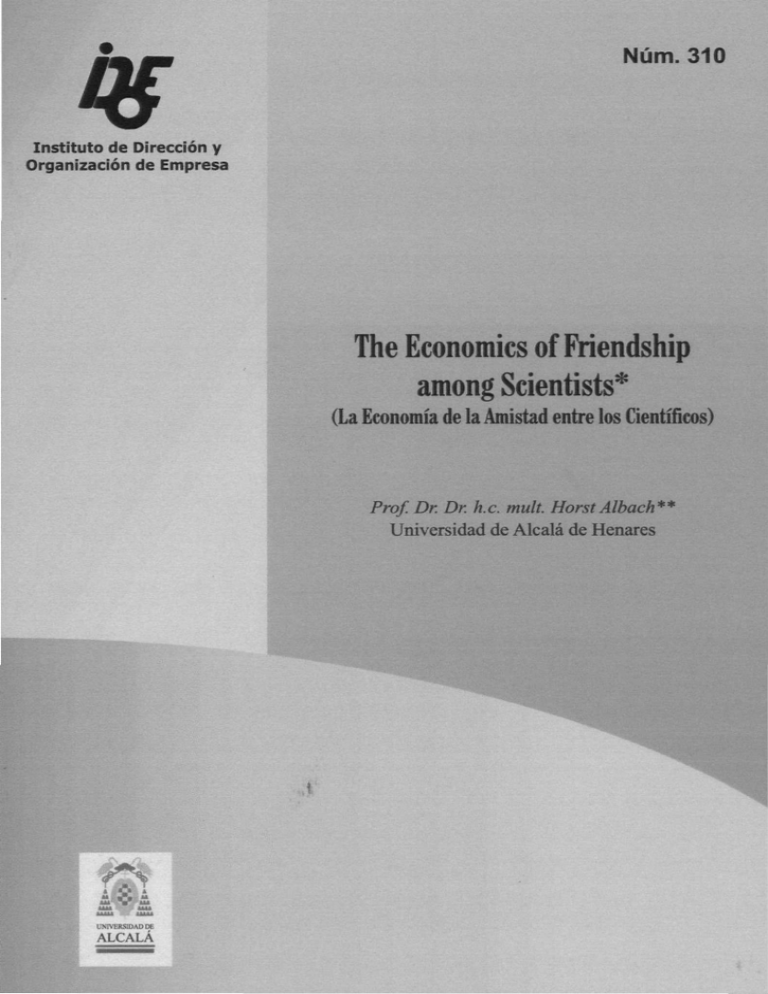
Núm. 310
Instituto de Dirección y
Organización de Empresa
The Economics of Friendship
among Scientists*
(La Economía de la Amistad entre los Científicos)
Prof. Dr. Dr. h.c. mult. Horst Albach**
Universidad de Alcalá de Henares
y
CONFERENCIAS Y TRABAJOS DE INVESTIGACIÓN
DEL INSTITUTO DE DIRECCIÓN Y ORGANIZACIÓN
DE EMPRESAS / Núm. 310
DIRECTOR: Prof. Dr. SANTIAGO GARCÍA ECHEVARRÍA
UNIVERSIDAD DE ALCALÁ
5904629636
The Economics of Friendship among
Scientists *
(La Economía de la Amistad entre los Científicos)
Prof. Dr. Dr. h.c. mult. HorstAlbach "
Alcalá de Henares, Abril 2007
*
Paper
delivered
to
the
International
Seminar
on
"Economy,
Entrepreneurship, Science and Society in the 2 1 a Century", a tribute to Prof.
Dr. Santiago García Echevarría, Alcalá de Henares, November 3"1, 2006.
** Professor Dr. Dr. h.c. mult. Horst Albach, Waldstr.49, 53177 Bonn.
{o
Author / Autor: Prof. Dr. Dr. h.c. mult. HorstAlbach
Abstract:
Albad) takes as bis point of departure the three myths around which today's research poücy revolves:
competition among sdentists, the ambit of incentives and even the impact ofan incentive to línk teaching
to research. He indicates that if the expectations of sdentiñc production are taken into account, this
orientation ivithin research is completely mistaken. This is due to the fact that there has been a shift in the
behaviour patterns of sdentists from a satisfactory one to a pattern of behaviour which is purely
opportunistjc; somethíng that is severely aggravated in the Bologna approach where competition between
individuáis istobe found m'thin the same university. In dassical Sdentifíc Life, sdentists did not compete;
it was left to the universities to compete, resulting in universities enjoying a greater or a lesser degree of
prestíge. In order to be able to achieve the proposed sdentifíc deve/opment, fríendship is one ofthe most
important factors in sdentifíc production. Albach a/so examines the dynamic functions of sdentifíc
production and a/so, and especially, the function of a sdentists usefulness with regard to Nicomedes'
Arístote/ian ethics. This is a brílliant initíal contribution in the revisión of the present approaches to
sdentifíc development and the behaviour of sdentists towards one another.
Arranca Albach de los tres mitos en los que se está centrando la actual política investigadora que
corresponden a la competenda entre los cientifícos, al ámbito de los incentivos e incluso al impacto de un
incentivo para vincular enseñanza e investigadón. Señala que esta orientación de la investigación es
totalmente errónea si se consideran las expectativas de producdónríenb'fíca.Ello es debido a que se pasa
de un comportamiento en las relaciones entre científicos satisfaaorío a un comportamiento de puro
oportunismo, lo cual se agrava enormemente con el planteamiento de Bolonia cuando esta competencia
entre personas se hace dentro de la misma universidad. En la vida clásica de la Ciencia los dentíficos no
entraban en competencia, sino las universidades, señalando universidades de alto nivel y de menos nivel.
La amistad constituye uno de los factores de producdón más importantes al objeto de poder lograr el
desarrollo dentífíco planteado. Plantea las funciones dinámicas de producdón y también, espeda/mente, la
fundóndeutilidaddeundentíficoentornoala
ética aristotélica de Nicomedes. Es una brillante
contriburíón inicial para una revisión de los planteamientos actuales del desarrollo científico y del
comportamiento de los científicos entre si.
Keywords / Palabras Clave: Science, Scientific Competition, Incentives, Friendship,
Function of Sdentific Production, Function of Scientific Usefulness / Qencia, Competencia
Científica, Función de Producción Científica, Función de Utilidad Científica.
Classjfkation / Clasificación: Jel 110, MÍO, M20.
Consejo de Redacción:
Santiago García Echevarría (Dirección)
María Teresa del Val Núñez (Coordinación)
Carolina Menor Navarro
Yolanda María Sánchez Jiménez
Secretaria y Administración:
LD.O.E.
Instituto de Dirección y Organización de Empresas
© Prof. Dr. Dr. Santiago Garda Echevarría
Dirección del I.D.O.E.: Plaza de la Victoria, 3
28802 - Alcalá de Henares
MADRID - ESPAÑA
Teléfono: +34 91. 885.42.00
Fax:+34 91.885.51.57
E-ma¡l: idoeiiSuah.es
http://idoe.QlouDm.com / www2.uah.es/idoe
ISBN 978-84-8187-128-9
Depósito Legal: M-30798-2007
EDITA:
LD.O.E. (UNIVERSIDAD DE ALCALÁ).
IMPRIME: SOKAY SYSTEM, S.L.
Paseo de la Estación, 7 - 28807 Alcalá de Henares (Madrid).
Index
Page
1. Introductory Remarks
1
1.1.
Competition among Scientist
1
1.2.
Cooperation among Scientists
2
2. Friendship ¡n the Production Function of the Agent
3
2.1.
2.2.
Human Capital Theory
Complementarity Theory
3
4
2.3.
Dynamic Production Theory
5
3. Friendship in the Utility Function of the Agent
7
3.1.
Nikomachian Ethics and the Market
3.2.
Ethics and Friendship
4. Concluding Remarks
5. International Seminar on "Economy, Entrepreneurship,
Science and Society in the 2151 Century": Program
7
8
9
9
THE ECONOMICS OF FRIENDSHIP AMONG SCIENTTSTS
1. Introductory Remarks
1.1.
Competition among Scientists
Quite recently, Santiago García Echevarría has made a wonderful
contribution to a volume edited by the Germán Academic
Exchange Service on the topic: "How do foreigners experience
Germany?" Santiago made friendship with Germans the subject
of his contribution. This contribution may have been inspired by
the slogan of the World Championship in Soccer "Zu Gast bei
Freunden", but it has really been an expression of love with his
Germán friends and the Germán people. This paper has been the
inspiration for my contribution to this seminar.
One of the myths in the economics of education is that
competition among scientists improves scientific output. Another
myth, closely related to the first one, is that monetary incentives
are strong drivers of scientific output. A third myth is that high
monetary incentives like severance payments are needed to
induce a scientist to exit the market for teaching and research.
Some people might object to calling the positive relationship
between scientific output and competition a "myth". They
consider every scientist to be in the race for the Nobel prize and
try to find appropriate incentives for scientists playing in the
minor league to reach the major league and then, eventually, the
race for the Nobel Prize.
Others might say that it is cooperation in large research institutes
that brings about products that are competitive in the race for
the Nobel Prize.
We obviously have to define carefully what kind of competition
we mean when we test for the hypothesis that competition has a
positive effect on scientific output. Traditionally, there was no
competition for research funding between colleagues ¡n a
university. But there was certainly competition for reputation
between different universities. Heidelberg and Góttingen are
classical examples.
Today, the Bologne process has introduced competition among
colleagues of one and the same university as an allegedly
effective driver of scientific output. We have already become
witness to changes in the behaviour of colleagues: from peaceful
behaviour to opportunistic behaviour with adverse effects on
scientific output.
1.2.
Cooperation among Scientists
Germán scientists experienced the effects of antagonism between
colleagues in the students' riots of the late sixties. Some
professors sided with the students, others defended the freedom
to teach. During those times, nobody could be sure that his
colleague would not turn out his enemy. This resulted in a very
unproductive faculty environment. Only those faculties with
professors who said "Right or wrong: my colleague and friend"
remained productive.
Today, we celébrate Professor Santiago García Echevarría on the
ocasión of his retiring from active university service. My
friendship with Santiago dates back to his time of studies at
Cologne University when Professor Gutenberg inspired both of us
to build on the foundations he had laid. We wanted to develop a
dynamic theory of the firm with investment in the firm 's assets
as one pillar (Horst Albach) and human resources as the other
(Santiago García Echevarría). We benefited very much from each
other's work. Our studies in the transformation processes of
Spanish firms after Spain had become a member of the European
Community proved to be helpful in the analysis of transformation
processes of firms in the former Germán Democratic Republic two
decades later. Our comparative research in social responsibility
and corporate governance has certainly improved our
understanding of the role of firms in society and of the
reiationship between the respective systems of corporate
governance and international competitiveness of firms.
In this paper, therefore, I want to make the point that friendship
is an incentive much stronger than competition in the production
of scientific output. In the first part, I will look at friendship as a
factor in the dynamic production function of scientific output. In
the second part, I will incorpórate friendship ¡n the utility function
of the agent that produces scientific output.
2. Friendship in the Production Function of the Agent
In this first part, I will start with human capital theory. Then I will
take a look at complementarities through friendship, and finally, a
dynamlc production function with friendship as a factor of
production will be introduced.
2.1.
Human Capital Theory
In classical economics, the production function of the firm is
described as a functional reiationship between the factor output
and two factor inputs: labor and capital. For a long time,
discussions of the validity of such an approach centered on the
issue whether land could be assumed to have the same quality
everywhere or whether it was mandatory to distinguish different
types of land as input factors.
It was not until Gary Becker asked the analogous question with
respect to the input of labor that it became customary to
distinguish between unskilled and skilled labor. It takes
investment in apprenticeship to produce skilled labor. In order to
prevent skilied labor to move from firms with vocational training
to firms without vocational training but a higher market rate of
wages, Becker ¡nsisted that vocational training was "productspecific" and not general, so that there were no external effects
of vocational training. Since firms do not invest in firm-specific
training alone but also ¡n other skills like team work and
organizational design, it has seemed appropriate to add to
Becker's labor factors a sepárate production factor called
"human capital". It was shown empirically that investment ¡n
human capital as a production factor has a positive impact on
output.
However, this development of production theory took place within
the framework of static analysis. Since friendship is an element
which may vary considerably in its intensity over time, static
production functions do not seem appropriate to incorpórate
friendship as a production factor.
2.2.
Complementarity Theory
Paul Milgrom has revitalized the notion of complementarity in and
among firms. He defines complementarity as follows: "Several
activities are mutually complementary if doing more of any one
activity increases (or at least does not decrease) the marginal
profitability of each other activity in the group"1. Milgrom
assumes complementarity to be linear.
Complementarity takes many forms in the firm. For instance, one
research project may positively influence another research project
to the extent that raising research expenses on one project may
positively influence the marginal profitability of the other research
project. Or, raising the expenses for continued vocational training
may raise the marginal profitability of expenses on personnel
marketing.
Analogously, friendship among scientists might be understood as
complementarity between the research activities of two (or more)
scientists. The research results of one scientist motívate the other
scientist to intensify his own research. This sounds like
competition rather than cooperation. But it would be competition
in the Japanese sense, not in the Western sense. It would be
competition in perfect harmony, competition with the effect of
strengthening each other. But complementarity in its strict sense
means an increase in the valué of the other's output and not
1
Milgrom, Paul; Roberts, John: Economics, Organization, and Management,
Englewood Cliffs, New Jersey 1992, p. 108.
4
necessarily an increase in his output.
Of course, this complementarity cannot be assumed to be linear.
The more research output one agent produces, trie less time
remains for other scientists to read the research results of the
other researcher. Therefore, the valué of his research may
gradually decline although the marginal valué is still positive. The
marginal valué of friendship would decline with output. This does
not seem to be an appropriate formulation of the productive
effects of friendship.
Therefore, in the next section I will try to show that friendship is
a factor of production in a dynamic formulation of the production
function.
2.3.
Dynamic Production Theory
Erich Gutenberg wanted to explain the coordination of factor
inputs in what he called the ,,combination process". In the
combination process management combines the elementary
factors of production, fixed assets, working capital, and labor with
the objective to produce a marketable product. This, basically, is
a static concept also. Erich Gutenberg could not at the time
formúlate a dynamic production function which explains an
efficient trajectory over time when the volume of demand
changes. Lary Epstein and Michael Denny developed such a
production function ¡n 19802. They considered raw material input
as perfectly elastic and the inputs of capital and labor as quasi-fix
production factors. It takes time to adjust a quasi-fix factor to a
new optimal level. The lower the costs of adjustment, the faster
the new optimal level of the quasi-fix factors is reached. In our
extensions of the dynamic production function, we kept raw
materia Is as a variable factor3 and added human capital and
2
Epstein, Larry G.; Denny, Michael G.S.: Endogenous capital utilization in a
short-run production model, theory and an empirical application, in: Journal
of Econometrics 12 (1980), pp. 189 - 207.
3
Albach, Horst: Die Bescháfbgungsentscheidung der Unternehmungen.
Arbeitslosigkeit aus betriebswirtschaftlicher Sicht, in: Gahlen, Bernhard;
5
corporate governance as two additional quasi-fix factors of
production in the dynamic production function4.
We now add a fifth quasi-fix production factor: friendship. We
measure output of research results as a function of the quasi-fix
factors capital (room size and library size and access), labor
(number of research assistants), corporate governance
(degree of independence from bureaucratic regulations; amount
of freely disposable travel money), human capital (number of
PhDs, MBAs and mathematicians in the research group), and
friendship (intensity of communication; ordinal valué of
importance attached to cióse personal relationships). In order to
measure friendship as an input factor, we first start with an
aggregate measure of friendship. I suggest to use the number of
individuáis that have contributed to books honoring a scientist on
various occasions as a measure for the input factor "friendship
capital".
Secondly, the input measure of friendship is the individual
relationship of the scientist with a particular individual, termed
"friend". The empirical test of total annual output of publications
by Horst Albach would certainly show that his friendship with
Santiago Garda is statistically significant and that its parameter is
high. One conclusión from this result is that the honorary doctor's
degree Horst Albach has been awarded by the Universidad de
Alcalá is to a measurable degree due to his friendship with
Santiago García.
We would not test a production function with all the friends of a
scientist entering as individual inputs separately because of the
Hesse, Helmut; Ramser, Hans Jürgen (Hrsg.): Arbeitslosigkeit und
Moglichkeiten ihrer Überwindung, Tübingen 1996, pp. 83 -129.
4
Kayser, Stefan: Die Dynamik der Unternehmenstransformation ¡n
Osteuropa. Eine theoretische und empirische Untersuchung des betrieblichen
Transformationsprozesses, Wiesbaden 1999; Albach, Horst: Kreatives
Organisationslernen, in: Albach, Horst; Dierkes, Meinolf; Antal, Ariane
Berthoin, Vaillant, Kristina (Hrsg.): Organisationslernen - institutionelle und
kulturelle Dimensionen, WZB-Jahrbuch 1998, Berlín 1998, pp. 55 - 77, esp.
Section 3.2.
6
problem of multi-collinearity.
We sum up a first result of our analysis. The production-theoretic
approach has proven that friendship is an important factor of
scientific production. Friendship improves scientific productivity.
If we stopped at this point, the true valué of friendship would not
be captured. Friendship would be a factor of scientific production
of an individual with the (solé) objective of dimbing the ladder of
performance ratings in the scientific community faster. Investing
¡n friendship would be nothing but an expression of selfish
interests5.
3. Friendship in the Utility Function of the Agent
3.1.
Nikomachian Ethics and the Market
In modern micro-economic theory the assumption is made that
economic agents maximize their personal utility and firms
maximize their profits regardless of the consequences for other
agents in society. Such behaviour is called "opportunistic".
Asymmetries in the knowledge base of the agents can be
exploited to one agent's benefit and to the damage of the other
agent. The other agent tries to avoid the detrimental effects on
him of such asymmetries by concluding contracts with the other
agent that motívate him to disclose all appropriate information
and knowledge. Thus, in a society of lone and selfish wolves
contracts are essential for survival of the species. But since all
contracts are incomplete, there always remains some risk.
The roots of this type of economic theory remain unclear. Here, I
suggest that the theory of opportunistic behaviour goes back to a
misunderstanding of the teachings of Adam Smith. He has been
read to say that profit maximization by the firm is the proper
5
In a rather subtle paper George Akerlof argües that altruistic behaviour
may result from the incentive to preserve power of the ruling class. See
Akerlof, George A.: Loyalty Filters, in: The American Economic Review
LXXIII (1983), pp. 34 - 63.
7
objective function. Selfish behaviour is economically rational and
socially and morally justified. In my view this is an incorrect
¡nterpretation of Adam Smith. Being a moral philosopher he knew
quite well the writings by Aristotle, ¡n particular his Nikomachian
Ethics. In proving that the invisible hand of the market takes care
of the interests of the customers, he relieved the agents
operating on those markets of the responsibility to care about the
interests of the other agents specifically. Therefore, his objective
function could contain one element only: his own profits. Since
the firm knows that profit maximizing on a market with workable
competition results ¡n higher social welfare, the firm does not
have to take the ¡nterests of other stakeholders into its objective
function explicitly.
3.2.
Ethics and Friendship
Friendship is a 2-Person relationship. Therefore, the Smithassumption of workable competition does not apply. Therefore,
we have to go back to the original Aristotle utility function of
man.
Aristotle proposed that the mission of man in life ¡s to achieve
eudaimonia, a life of fulfillment. Life is fulfilled when man's
activities have benefited himself and contributed to the "fellowwellness" (Adam Smith) of others. In particular, the others are
cióse friends.
Therefore, eudaimonia is reached when the personal benefits and
the well-being of friends is maximized. Thus, the Aristotle utility
function of a scientist contains two elements: Research results of
the scientist's own endeavours and research success of his
friend(s). In my model of the economics of friendship these two
elements have weights adding up to 1. Self-interest in its strict
sense may have the same weight as a friend's happiness, but in
general it may lie between one half and less than one. Whatever
the weights: this utility function exeludes opportunistic behaviour.
In fact: solving the model with an Aristotle utility function may
result in lower benefits from one's own research and higher
benefits from the satisfaction of having contributed to the
8
success of the friend's research success. In any case, total
personal utility ¡s higher than profits..
4. Concluding Remarks
Friendship as a relationship between two persons cannot be
¡nterpreted as a relational contract. It is a pre-contractual
relationship. Seeking friendship increases personal utility. I would
not want to cali it "friendship-rent-seeking" when a person tries
to contribute to a friend's happiness. It is moral behaviour on the
basis of Aristotle's Nikomachian ethics, or, if you want: Christian
ethics.
I would like to express my gratitude to my friend Santiago Garda
on this occasion for many years of cióse friendship. I know that
he is a man with an Aristotle utility function. My attempt to
develop an economic theory of the firm with an Aristotle utility
function has been motivated by our friendship. I am sure this
theory can be extended to more general non-market
relationships. It may be used as a theoretical basis for discussions
on "Ethics in Business".
5. International
Seminar
on
"Economy,
Entrepreneurship, Science and Society in the 21 5 *
Century": Program
VENUE
Sala Internacional
Universidad de Alcalá
Plaza de San Diego, s/n
28801 - Alcalá de Henares
FOR FURTHER INFORMATION:
Prcf. Dr. Teresa del Val
IDOE
Departamento de Ciencias Empresariales
Universidad de Alcalá.
Plaza de la Victoria, 3
28002 - Alcalá de Henares (Madrid)
Télf: + 34 91 885 42 00 / + 34 91 885 4203
Fax: + 34 91 885 51 57
E-mail: [email protected]; [email protected]
ORGANISED BY:
Universidad QE
1
10
A!
1/
%/ln
YOrg.jn:;:3CÍO"(iíemprí>}í
i l » \1( Al \
M Universidad
Mwá. de Alcalá
A Tribute to Santiago García Echevarría
International Seminar
Economy, Entrepreneurship,
Science and Society in the
XXI Century
Alcalá de Henares, 3rd November 2006
11
12
09.00
Accreditatksn
09.15
Opening of the scíentiísc symposium
Prof. Dr. Fernando Calven, Vice President for
Academic Pianning and Staff of the
University of Alcalá
Mr. Detief Weigef, Minister CounseUor of the
Germán Embassy m Madrid
Prof, Dr, Gregorio Rodríguez Cabrero, Dean
of the Business and Economic Facutty ofthe
University of'Akaiá
Prof. Dr, Migué! Santesmases, Univsrsity of
Alcalá
Mr. Juan José Rodrigo Tobajas, President of
Asociación de Amigos de ¡a Universidad de
Atedia
10.00
The Economtcs of Friendship amone;
Scientists
-ii f. [• H T c t L ">.-ch Uní.- i i t , of Berhn
10,45
Law and Etílica
Prof. Dr. Rafael ASvira, university of Navarra
11.15
A Case against Foreign Exchange Market
Interventton of the ECB
Prof. Dr. Wim Kosíers, University of Bochum
11.45
Coffee break
12.15
Developint} a Leadership Compaíiy:
Leadefship as core competeney of the firiu
Prof. Dr. Hans Hinterhuber, University of
Innsbmck
12.45
Retentton Management for High Poteiitials
Prof. Dr. Norbeit Thom, University of Bern
13.15
Advertising and the spirit of the age
prof. Dr. Hermami Saoei, Unsversiíy of Bo?>rs;
13.45
Open dsscussion
14.45
Lunch
Í6.00.
Round
tsbie:
'••:•
"EconofHy, Éittrepréiiéií'rs¿liijíí « t i e n t e ¡áad
Society in the XXI centu
- Rebert físten, Dtreetm-.,of: Man@gementForschungs-Team, Cofogne
..;. : .•.
- Mr. Javier Ramiro, €EOPhñ¡ps ¡herma, S.A.
- Mr. Jord¡ Moüna, Mstmwk Aréa.C&arámation
Aquss de Barcelona
'•• V
::
•
- Mr. Martin Corral. Megioágl p^ectGc Siemens,,
S.A
'
:
•
:
- Mr. Antonio Castillo ;Ba!gado, Corporate
Depttty General Manager Telefónica
- Mr. Enrique Maitínsz Piqueras, Presiden? of
UNICEM
Chairmann: Di: Rohert Fíet&i Director of
Management-Forscfrungs-Tsam, Cologne
18.45
Cíosing or the Seminar
- Prof. Dr. Utaido Nieto, Presidéntofthe
Spanish Coutt of Audit
•.: •
- Prof. Dr. Santiago García Echevarría,
University of Alcalá
19.15
V*no español
:
:
'
.
v;;
Ttiere wift be srmtdtáneous h-<r<isíatíon io Spcmisk mid English
13
INDEX OF WORKING PAPERS - SERIAL OF BUSINESS POLTTIC
301 / BROCKOFF, K. (2005): 'Techonological Change and Corporate
Governance", Alcalá de Henares, 30 págs.
302 / GARCÍA ECHEVARRÍA, S. (2006): "Ajuste del Sistema de
Educación Superior Español a las exigencias comunitarias", Alcalá de
Henares, 33 págs.
303 / GARCÍA ECHEVARRÍA, S. (2006). "Responsabilidad Social
Corporativa: La Responsabilidad Social Corporativa como orientación
del management empresarial", Alcalá de Henares, 33 págs.
304 / GARCÍA ECHEVARRÍA, S. (2006). "Ética y Globalización: Su
integración e institucionalización (Problemas éticos en torno a la
globalización)", Alcalá de Henares, 44 págs.
305 / GARCÍA ECHEVARRÍA, S. (2006). "üderazgo y estrategia en la
empresa: Los nuevos enfoques profesionales", Alcalá de Henares, 38
págs.
306 / GARCÍA ECHEVARRÍA, S. (2006): "Economía de Mercado y
Desarrollo de la Persona: La gobernabilidad de las Instituciones
Empresariales", Alcalá de Henares, 20 págs.
307 / FRÜHWALD, W. (2006): "Mercados de la educación con la
Universidad en la trampa de la globalización", Alcalá de Henares, 27
págs.
308 / LASKE, S.; MEISTER-SCHEYTT, C. (2006): "In Search of the FFF
(Rt for the Future) University: Corporate and organisational demands
for the efficient and effective development of universities", Alcalá de
Henares, 21 págs.
309 / GARCÍA ECHEVARRÍA, S. (2007): "¿Dónde se encuentra la
persona en nuestro ordenamiento económico-social?", Alcalá de
Henares, 35 págs.
El IDOE (Instituto de Dirección y Organización de Empresas)
de la Universidad de Alcalá fue creado en el año 1979. En sus más
de 27 años de trayectoria, este Instituto perteneciente a la
Universidad de Alcalá, se ha configurado como:
D
D
D
D
0
Un centro dedicado a la formación continúa de directivos.
Una unidad de colaboración con empresas en materias de
asesoramiento, gestión y dirección.
Centro impulsor de proyectos de investigación en estrecha
colaboración con el sector empresarial.
Entidad organizadora de conferencias y congresos tanto
nacionales como internacionales.
Promotor en la edición de publicaciones, con un número
superior a 400, siempre dentro del campo de la economía y
de la dirección empresarial.
La filosofía y los objetivos del IDOE se desarrollan en actividades que
se apoyan en la colaboración internacional y el mundo empresarial
con el ámbito universitario, sirviendo de engranaje entre el ámbito
científico universitario y el mundo directivo-empresarial.
El IDOE imparte programas de postgrado en colaboración con
empresas e instituciones internacionales de reconocido prestigio.
Desarrolla proyectos de investigación en materias de economía,
dirección empresarial y dirección de comunicación. Así mismo
imparte programas de pregrado con el fin de acercar el conocimiento
empresarial a los estudiantes además de desarrollar programas de
formación para jóvenes directivos.
El objetivo que pretende con sus publicaciones es difundir, en un
lenguaje sencillo, los nuevos conocimientos y desarrollos entre el
mundo empresarial y el mundo universitario, a nivel nacional como
internacional.
Para elloel IDOE ha desarrollado
sus publicaciones dentro de las
siguientes colecciones cuyas aportaciones provienen del entorno
académico y del mundo empresarial:
Working Papers:
Serie Azul (Política y Estrategia Empresarial): 310
números.
Serie Roja (Documentos Docentes): 104 números.
Serie Marrón (Conferencias): 5 números.
Informes y Dictámenes: 18 números.
Documentos a Debate: 8 números.
Libros.
Serie Política Empresarial.
Serie Management.
Serie Universitaria.
Revistas.
Dirección:
Prof. Dr. Santiago García Echevarría
Coordinación:
Prof. Dr. María Teresa del Val Núñez
Para más información:
Prof. Yolanda Ma Sánchez Jiménez
I.D.O.E.
Instituto de Dirección y Organización de Empresas
Plaza de la Victoria, 3
28802 - Alcalá de Henares
MADRID - ESPAÑA
Teléfono: + 34 91. 885.42.00
Fax: + 34 91. 885.51.57
E-mail: [email protected]
http://idoe.gioupm.com / www2.uah.es/idoe
Alcalá de Henares, 10 de mayo de 2007.
Instituto de Dirección y Organización de Empresa (IDOE)
Universidad de Alcalá
Plaza de la Victoria s/n
28802 Alcalá de Henares
MADRID ESPAÑA
Teléfono 91 885 42 00
Fax 91 885 51 57
[email protected]
www.idoe.org
http://idoe.gioupm.com

